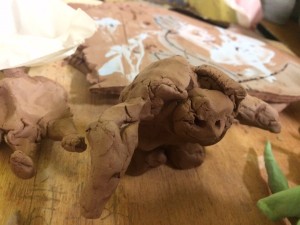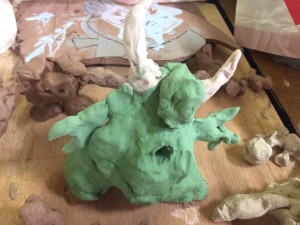 I don’t talk very much about my kid on the open internet, which is less about how I feel about privacy and the internet, and more about how I feel about both consent and future conversation I may have with my kid about when and how I shared my feelings, and shared their life.
I don’t talk very much about my kid on the open internet, which is less about how I feel about privacy and the internet, and more about how I feel about both consent and future conversation I may have with my kid about when and how I shared my feelings, and shared their life.
However, my experience as a mother is mine, just as my kid’s life is theirs. My experiences as a mother have revealed important perspectives that I have used to frame other parts of my life. Also, my life as a mother isn’t all about my kid. My kid is just being a kid in that way that they do, where so many experiences are for the first time, and can be sorted into rather larger and rough categories like uncomfortable, joyful, general life information. Not that I believe a healthy and privileged kid’s life is simple, just that it is very present, and not yet as interjected with trauma and fear and the past and the looming future as my life experience feels to me. Mothering, then, mothering from a position largely of privilege, isn’t just about my kid, but about whatever in my life intersects with parenting and how those intersections lead me to make decisions, and to feel.
Even parents who parent within paradigms of racism, for example, whose kids have both the intensity of presence all childhoods do and must be parented to recognize sources of danger, trauma, and inequality, aren’t all about their kids. My sense is, mainly from talking to a lot of parents in my work in pediatrics (and so anecdotal and filtered through all my own filters, but I do spend a lot of time thinking about kids and parents, even if my filters may be faulty), is that even for those very preoccupied with parenting, there is always, always a scrabble to preserve self.
I’ve often reminded myself that healthy parenting requires only three things – resources, respect, and the ability to solve problems. This, I think, is the widest possible gate for the greatest diversity of family units to be deemed healthy. Families that are very different from each other – culturally, religiously, politically, philosophically – can be healthy. Also, a lack of any of those three things can be our fault, as a world, as a society, which may mean that helping some families is a matter of social justice. Many times, when I’ve struggled as a parent, I’m able to think about what it is of those three things I don’t have, or is impoverished, and then I’m able to be kinder to myself.
None of this is a disclaimer for one particular perspective I’ve gained, recently, but maybe why I was so moved and enlightened by something that happened with my kid. Lately, I’ve been thinking and thinking about my three things, and if I’m okay, if we’re okay, and also, I’ve been struggling with self. I’ve been struggling with choices, and if I’m making them to my benefit. I’ve been struggling with what has been choice and what has been fear and trauma and resources and my ability to solve problems.
I’ve been struggling and breaking and mending and then cracking some new and unexpected way.
What I’d say about my kid is that they’re the most interesting person I know, and fierce. Sartorially fascinating, anxious, explosively brilliant, huge-hearted, a genuine hero, and for teachers, challenging. So challenging for teachers, actually, that once, one of their teachers asked me out for a drink because she “enjoyed talking with [me] so much,” except, I had never talked to her, she had only talked to me, at length, every day, at school pick up, venting about my kid such that I guess I felt to her like a friend, like company that felt good because I received and processed so many of her bad feelings.
My experience, as a parent, is that every formalized or even vaguely institutional activity will introduce certain kinds of challenges for my kid and their teachers. It will also, unexpectedly for the teachers, introduce joy and singular experiences such that no matter how they have vented, they grow to love my wilding child and my child’s refusal to accept a world for them and their friends that is less than ideal and storied and engaging. Meeting my child, loving my child, is to find oneself unexpectedly aspirational even while exasperated.
So there was summer ceramics. My kid, fully validated by privilege, had a number of these kinds of camps and classes lined up, in between reckless play and hours holed up with books. I was nervous about Art Camp, including the ceramics portion, because I knew there would be many aspects of it in direct and terrifying challenge to known areas of difficulty for my kid. This was partly why I signed them up, even going so far as to lie on the part of the camp application that asked me to promise my kid could handle this kind of environment, to lie with righteousness, I might add, because how dare they keep fine arts from kids who can’t handle the studio environment! Obviously, Art Camp are assholes.
Of course, after the first morning, inevitable pick-up venting rained coldly down on my righteousness, dampening it, leading me to side eye my child, who looked, as usual, happy enough. Afternoon pick-up, though, ceramics studio pick-up, was different.
I like this kid. “Vented” the ceramics instructor. This kid is interesting. This kid created more than anyone else, and destroyed more than anyone else. Created and destroyed, over and over. Are you okay with that? Because I think it’s cool.
The ceramics instructor thought my kid was cool. My kid was so covered in slip and clay they could have been fired to a glossy hardness, and had no project to show for their day, but also, was cool.
Yes, thank you. I think I said, because I couldn’t kiss him.
The next day, I somehow escaped being pick-up lectured after morning studio, and then, I pranced a little into ceramics studio because I was there to pick up my kid who had this entirely new label of cool. Except, when I ran into the instructor, his forehead was wrinkled. My heart went cold and still.
Today was a struggle. He began, and so I went to that place that I sit in my head where the walls are blank and the chair is uncomfortable and I am receiving bad news. When I looked down at my kid, there were tears poised to fall, over blotchy cheeks.
Fuck. I said inside the room.
Today was a struggle. He started again, and then I think it was a while before I actually heard him. . . . which is a thing, right? Struggling. Tells me we don’t have it all right. I was thinking, maybe, that they’re bored. There isn’t anything here for them, right now, but this clay and new information about techniques, but that’s not enough for someone with such a big story to tell. I was wondering, if for tomorrow, they could come with stories. Not an idea, or some thing they wanted to make, but some story they were excited about, that meant something to them. This is a kid that requires stories, and meaning, and to make things with meaning using a story.
It’s hard not to cry when your kid is really seen. When someone else articulates a sense you haven’t put words to yourself yet, about your kid, or someone you desperately love. Even more emotional is when this perspective is entirely new, and replaces venting and “difficult” and “hard work” with a strategy for school and life and work that is based on play, and process, and meaning.
Which is a big revelation to have in response to a handful of sentences delivered off-the-cuff by a guy who looks more likely to be guiding whitewater rafting trips than teaching studio ceramics, but it was the first drink of water in a really fucking big desert, so his words might as well have been delivered by trumpet and seraphim.
My kid was tearful for a while, having absolutely struggled. I was eventually able to ask them what story they’d like to bring in tomorrow. Though I’d been parenting this kid for eight years, and had tried some epic number of problem-solving ideas, my kid immediately, somehow, knew what I was talking about.
I had that dream last night about letters, and the phases of the moon. I think it’s a story. 
Then they made a series of posters with the alphabet, and demanded I print out a moon chart, and there was something about space hippos. There was also glee and resolve and anticipation.
After studio the next day, my child was ghosted over with dried clay and beaming. The instructor was beaming, too, and started saying things like focused, hard working, engaged, productive. Things that are true, but almost never at school. They had a story to tell, and it was important. So important, that neither the teacher nor my kid could stop talking about it. That day, and the days after, weren’t a struggle, because my kid had been given permission to tell a story, and telling stories was worthy of work, and process, and productivity, and engagement.
This is the part where I learn something, not so much as a mom, though I learned a lot there, too, but the part where I learn for the self. I said I’ve been struggling. Struggle is a fight, right? A push/pull one way, and then another. Struggles are within and without and are fertile for confusion in making decisions, and reliance on old ways of thinking, and venting, and fear. They rarely feel progressive, but often are, I think. We say, The struggle is behind me, as if it provided some kind of momentum. Or, It will be a struggle, but then I’ll be better for it, as if it were able to burnish the cracks and broken places with gold leaf.
A struggle the way I have been feeling it, the way my kid’s ceramic instructor described it, is more static — or at least, it is a sign, something we’re able to see and feel if we’re not able to act or engage or work. A struggle is one of the first welcome returns on our living – it says, Okay, I get it, we’ll stop here, but where are your resources? Where is your respect? How are you going to solve this problem?
For me, for my kid, here’s something to say back to struggle: I have to tell this story.
We don’t get very many chances, or time, and our whole world is struggling. We struggle forward, worrying our resources and respect and solutions in our pockets like polished stones. We dream, we insist on our tears, we look at unlikely people, people in cargo shorts and calf tattoos, with new hope.
 We tell a story, we create and destroy, we’re covered in clay and ashes, ready for the fire.
We tell a story, we create and destroy, we’re covered in clay and ashes, ready for the fire.





















